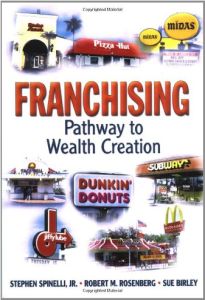Join getAbstract to access the summary!

Join getAbstract to access the summary!
Stephen Spinelli Jr., Robert M. Rosenberg and Sue Birley
Franchising
Pathway to Wealth Creation
FT Prentice Hall, 2004
What's inside?
If passing that burger joint makes you want to own a franchise, here's how you can join that $1 trillion industry.
Recommendation
Being an entrepreneur who sells a brand name product in a consumer-conscious marketplace is an appealing way to make a living. It must be: the U.S. franchise market hit $1 trillion in sales in 2003. But franchising is a deceptively complex business for both the franchisee and for the franchiser who creates the idea, builds the brand, tunes the delivery system and maintains sensitive franchisee relationships. Franchisers build, deconstruct and syndicate businesses to those who may lack the experience to offer a specific service or product. Entrepreneurs with business acumen and a keen desire to build something for themselves often find that franchising offers many ways to create wealth. This meaty book thoroughly explains how you can succeed in a franchise business. Its nuts-and-bolts presentation is enlivened by case studies from Jiffy Lube, Bagelz, Dunkin’ Donuts, Subway, Pizza Hut and McDonald’s. getAbstract.com recommends it as essential reading for anyone considering buying or starting a franchise.
Summary
About the Authors
Stephen Spinelli Jr. co-founded Jiffy Lube International and became its largest franchisee with 47 stores that posted 39 consecutive profitable quarters. He now teaches entrepreneurial studies at Babson College. Robert Rosenberg, CEO of Dunkin’ Donuts for 35 years, led the firm’s growth from 300 units to more than 3,000. He is now on the Board of Directors of Sonic, America’s Drive-In. He is also a member of the International Franchise Hall of Fame. Sue Birley is the former director at National Westminster Bank, the world’s largest franchise lender.
















Comment on this summary